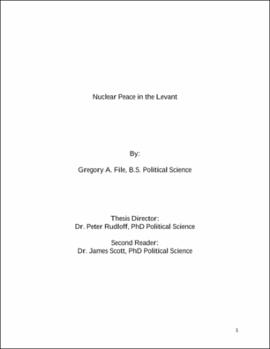| dc.contributor.author | File, Gregory A. | |
| dc.date.accessioned | 2018-06-18T20:12:29Z | |
| dc.date.available | 2018-06-18T20:12:29Z | |
| dc.date.issued | 2010-07-02 | |
| dc.identifier | oksd_file_HT_2010 | |
| dc.identifier.uri | https://hdl.handle.net/11244/300112 | |
| dc.description.abstract | Ever since the first atomic bomb was dropped over Japan to end World War II, there have been many questions that arise from the use of nuclear bombs. There are two basic arguments for the employment of nuclear weapons. One is the deterrence policy. This ensures that a state will not be attacked by its hostile neighbors. The second is a policy of brinkmanship. This is the policy of using one's nuclear arsenal to coerce others to give into one's demands. Both of these policies will be explored in this paper. | |
| dc.description.abstract | The main point of this paper is to explore the relations between Israel and the Arab neighbors who were involved in the Arab-Israeli wars. Specifically, the paper will look at when Israel proliferated in order to gain a better understanding if that event played any factor in producing peace/cold peace between Israel and these Arab countries. The paper will end by examining the problem of Iran, and offering policy suggestions on how Israel can use its nuclear program to bring peace to the Levant. | |
| dc.description.abstract | The paper will begin with an overview of the literature about the arguments for and against nuclear proliferation. Those arguments will be framed in the context regarding the countries of the Levant. The paper will examine the policies for deterrence and brinkmanship to gain a better understanding of if Israel's nuclear program brought peace to the Levant. The paper will then produce five hypotheses to test what brought about peace between Israel and her neighbors. It is hoped that the results of these tests will lie to rest the question if Israel's nuclear program was a significant factor in bringing about the relative peace between Israel and her Arab neighbors. The paper will end by examining the current problem of Iran. Finally, the paper will address shortcomings in the tests (if any) to give policy recommendations on how nuclear peace can be achieved in the Levant. | |
| dc.format | application/pdf | |
| dc.language | en_US | |
| dc.rights | Copyright is held by the author who has granted the Oklahoma State University Library the non-exclusive right to share this material in its institutional repository. Contact Digital Library Services at lib-dls@okstate.edu or 405-744-9161 for the permission policy on the use, reproduction or distribution of this material. | |
| dc.title | Nuclear peace in the Levant | |
| osu.filename | oksd_file_HT_2010.pdf | |
| osu.accesstype | Open Access | |
| dc.type.genre | Honors Thesis | |
| dc.type.material | Text | |
| dc.contributor.director | Rudloff, Peter | |
| dc.contributor.facultyreader | Scott, James | |
| thesis.degree.discipline | Political Science | |
| thesis.degree.grantor | Oklahoma State University | |
